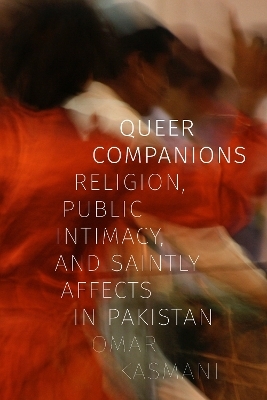
Queer Companions
Religion, Public Intimacy, and Saintly Affects in Pakistan
Seiten
2022
Duke University Press (Verlag)
978-1-4780-1803-2 (ISBN)
Duke University Press (Verlag)
978-1-4780-1803-2 (ISBN)
Omar Kasmani theorizes the construction of queer social relations at Pakistan’s most important Sufi site by examining the affective and intimate relationship between the site’s pilgrims and its patron saint.
In Queer Companions Omar Kasmani theorizes saintly intimacy and the construction of queer social relations at Pakistan’s most important site of Sufi pilgrimage. Conjoining queer theory and the anthropology of Islam, Kasmani outlines the felt and enfleshed ways in which saintly affections bind individuals, society, and the state in Pakistan through a public architecture of intimacy. Islamic saints become lovers and queer companions just as a religious universe is made valuable to critical and queer forms of thinking. Focusing on the lives of ascetics known as fakirs in Pakistan, Kasmani shows how the affective bonds with the place’s patron saint, a thirteenth-century antinomian mystic, foster unstraight modes of living in the present. In a national context where religious shrines are entangled in the state’s infrastructures of governance, coming close to saints further entails a drawing near to more-than-official histories and public forms of affect. Through various fakir life stories, Kasmani contends that this intimacy offers a form of queer world making with saints.
In Queer Companions Omar Kasmani theorizes saintly intimacy and the construction of queer social relations at Pakistan’s most important site of Sufi pilgrimage. Conjoining queer theory and the anthropology of Islam, Kasmani outlines the felt and enfleshed ways in which saintly affections bind individuals, society, and the state in Pakistan through a public architecture of intimacy. Islamic saints become lovers and queer companions just as a religious universe is made valuable to critical and queer forms of thinking. Focusing on the lives of ascetics known as fakirs in Pakistan, Kasmani shows how the affective bonds with the place’s patron saint, a thirteenth-century antinomian mystic, foster unstraight modes of living in the present. In a national context where religious shrines are entangled in the state’s infrastructures of governance, coming close to saints further entails a drawing near to more-than-official histories and public forms of affect. Through various fakir life stories, Kasmani contends that this intimacy offers a form of queer world making with saints.
Omar Kasmani is Postdoctoral Research Associate in Social and Cultural Anthropology at the CRC 1171 Affective Societies at Freie Universität Berlin and coeditor of Muslim Matter: Photographs, Objects, Essays.
Note on Orthography ix
Acknowledgments xi
Introduction. On Coming Close 1
1. Infrastructures of the Imaginal 36
2. Her Stories in His Durbar 60
3. In Other Guises, Other Futures 84
4. Love in a Time of Celibacy 107
5. Worlding Fakirs, Fairies and the Dead 130
Coda. Queer Forward Slash Religion 152
Notes 165
Glossary 181
References 185
Index 201
| Erscheinungsdatum | 31.03.2022 |
|---|---|
| Zusatzinfo | 19 illustrations |
| Verlagsort | North Carolina |
| Sprache | englisch |
| Maße | 152 x 229 mm |
| Gewicht | 340 g |
| Themenwelt | Geisteswissenschaften ► Geschichte ► Regional- / Ländergeschichte |
| Geisteswissenschaften ► Religion / Theologie ► Islam | |
| Sozialwissenschaften ► Ethnologie | |
| Sozialwissenschaften ► Soziologie | |
| ISBN-10 | 1-4780-1803-8 / 1478018038 |
| ISBN-13 | 978-1-4780-1803-2 / 9781478018032 |
| Zustand | Neuware |
| Haben Sie eine Frage zum Produkt? |
Mehr entdecken
aus dem Bereich
aus dem Bereich
Universalgelehrter, Polarreisender, Entdecker
Buch | Hardcover (2024)
mareverlag
28,00 €


